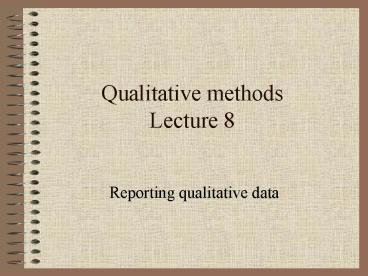Qualitative methods Lecture 8 - PowerPoint PPT Presentation
1 / 15
Title:
Qualitative methods Lecture 8
Description:
Has to contain the main aim, methods, results and implications of the study ... to both being a piece of 'art' and be able to resist an 'interrogation' in court ... – PowerPoint PPT presentation
Number of Views:56
Avg rating:3.0/5.0
Title: Qualitative methods Lecture 8
1
Qualitative methodsLecture 8
- Reporting qualitative data
2
Last time
- Validity, reliability and generalisability
- Think concepts in an everyday way
- A valid excuse
- Do I believe in these results?
- Are these results valid for other cases?
3
Today
- Making interview reports according to Kvale
- What is a good interview report?
- What is a bad interview report?
- Evaluation
4
A bad interview report is(according to Kvale)
- Boring
- Often with long, heavy, word-for-word quotations
- Presented in a fragmented way with primitive
categorisations - Often too detailed
- Often cut up in incoherent bits
- Longs for coherent stories
5
Reasons for bad texts
- The author can be drowning in comprehensive and
complex interview texts the personal perspective
gets lost - The author can go native
- The author can fear making subjective
interpretations - The author does not know, which story to tell
6
Methodological considerations
- Method as a black box (Kvale, p. 249)
- The reader has to guess what the researcher has
been doing - Necessary to judge the validity of the results,
reinterprete or apply them - Method neglect
- Can be due to a lack of formal procedures in the
research - Can be due to a lack of fixed conventions for
reporting
7
Other reasons...
- Counter reaction to the positivistic worshipping
of method - Bad method conscience?
- Are the applied procedures swept under the
carpet? - Fear and guilt of not matching the ruling ideals
for methodology?
8
Aim of reporting
- Inform other researchers and the public about the
significance and reliability of the results - Contribute with new knowledge
- Must be formulated in a way that the conclusions
can be controlled by the reader - Has to contain the main aim, methods, results and
implications of the study
9
With an eye for the report
- Thematizing
- Designing
- Interviewing
- Analysing
- Validating
- Reporting
10
The good interview report
- Is read
- Is direct communication, often with a few pages
summary - Has to live up to both being a piece of art and
be able to resist an interrogation in court
11
Relevant questions to ask
- Are the results interesting?
- Do they give new knowledge and new insights?
- Do they give rise to new perspectives on the
matter of research? - Which theoretical implications do the results
have? - Does the new knowledge support dominating
theories in the area or not?
12
Methodological considerations
- How reliable are the results?
- What is the methodological foundation?
- Which practical consequences does the study have?
- Are the results valid enough to take action on
their basis?
13
Contact between interview text and report
quotations
- Connection with the normal text
- Quotations must be contextualised
- Quotations must be interpreted
- Balance between quotations and text
- Quotations must be brief
- Use only the best quotation
- Reproduce quotations in a written form
- There has to be a simple sign system for the
editing of quotations
14
Space.
- Tempting to write more and more and more and
- Necessary with a critical and selective distance
15
Summing up
- Think in all phases of the project right from the
start - Think of a working process and a writing process
(Whats the story?)















![Lecture note : Gas chromatography [1] ????????? PowerPoint PPT Presentation](https://s3.amazonaws.com/images.powershow.com/6692254.th0.jpg?_=20150604093)















